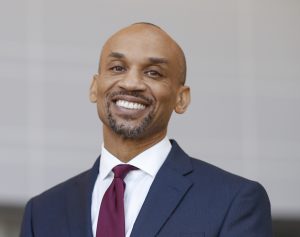By: Max Crampton-Thomas

2 min read April 2020 —Like all educational institutions, Johnson & Wales University – North Miami has turned to the online universe to deliver its programs amid the containment measures for COVID-19. President Larry Rice discusses the transition to online and what the future could look like in a post-COVID-19 world.
How have the faculty and student body handled the transition to all online classes?
Our faculty and staff have had to adapt to moving to virtual teaching during periods of crisis due to hurricane shutdowns that we have experienced in prior years. I must say that past campus preparations did not sufficiently help us in specifically anticipating the unforeseen issues resulting from having to transition to a fully virtual delivery format during a pandemic. Unlike with previous hurricanes, which required us to transition to virtual instruction, we could not predict the swiftness and fluidity of the changing dynamics of this pandemic. Therefore, our transition was peppered with heightened anxiety on all sides – parents, students, faculty and staff. However, together, we managed through those issues and were able to move all academic courses to our virtual platform. The university’s academic technology and instructional design department assisted faculty in adapting course material to the virtual environment. Since our students are conditioned to learn and acquire knowledge through hands-on applications, group collaborations and team-based projects, the transition to online learning was their greatest challenge. I am proud of how our students were able to make the necessary adjustments in such a short period of time, and I am especially proud of how our faculty and staff were able to meet this challenge in ways that can only be commended.
What unforeseen challenges did this present for the university and how did you mitigate those challenges?
The greatest challenge was to ensure the safety and well-being of our resident students, 10% of whom are international students who were away from their families during what could best be described as the greatest crisis in their young adult lifetime. Managing the fear and anxiety of our students in the midst of ever-changing information concerning what we were facing was surely the greatest challenge. Initially, our message to students was that we were moving all academic classes to virtual environments, out of an abundance of caution and we would follow CDC, state, and local guidelines while continuing to house students on campus.
This quickly changed to sharing with our students that to ensure the safety and well-being of our residences, we would need students to plan for a transition from the residence hall to a return home to be with their families. All but 19 of our 700+ resident students were able to return home to their families. JWU launched a taskforce of staff members to assist students who needed assistance with flights, ride-share transportation, buses, or gas cards. Any student who was unable to travel home or was from a country to which it was not safe to travel, was welcomed to stay at JWU, and the campus provided room and daily meals for those students.
As higher education adjusts to the current situation, what opportunities and innovation do you see carrying over post-COVID-19?
I believe that this crisis has provided all of higher education several teachable moments that we can learn from. Certainly, our dependence on face-to-face interactions has changed, and we must adapt. Having virtual, blended, and multiple other learning options available to students will become the norm. I foresee that the average classroom experience will shift to maximizing technology to allow for physical classroom instruction while simultaneously providing a remote live-streaming interactive option for students who are uncomfortable with a face-to-face interaction following this pandemic. I believe more time will be invested in moving that classroom experience beyond the physical walls, regardless of discipline, especially for more challenging curricula that require labs and hands-on activities. Prior to COVID-19 this was a nice thought, post-COVID-19, these curricular changes will become necessary and standard.
How does the university plan on handling graduation this year for those students who are slated to graduate at the end of the spring semester?
The university has postponed the May 23 commencement ceremony. Our plan is to host a ceremony for students only on Aug. 22 while providing a live streaming service for families to watch from their homes and any students wishing to be recognized during the ceremony but who do not wish to attend physically. We anticipate that all 2020 graduates will also have the option of participating in the May 2021 commencement ceremony.
What would your message be to the university’s student population and faculty that is sheltering in place and waiting for a return to normalcy?
Be strong and stay safe JWU Wildcats. We are making preparations for your return once the stay-at-home guidelines are relaxed and the CDC, state, and local agencies feel confident that you will be safe in returning to school.
To learn more about our interviewee, visit:
